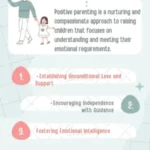In the dynamic landscape of parenting, where challenges range from social media-induced self-esteem issues to increasing rates of childhood anxiety and depression, the significance of positive parenting cannot be overstated. This approach focuses on cultivating responsible, caring, and resilient children through techniques grounded in love and respect. Far beyond a fleeting trend, positive parenting stands out as an effective, enduring method that fosters a connected and balanced parent-child relationship.
Understanding Positive Parenting
Shifting Perspectives: Becoming a Guide for Your Child
Contrary to the conventional belief that parenting primarily involves disciplining children to mold them into good individuals, positive parenting embraces the idea that children are inherently good. The essence of positive parenting lies in guiding children as they navigate the complexities of their emotions and cognitive development. Rooted in the Latin term “disciplina,” meaning teaching and learning, positive parenting seeks to empower children to modify their behavior with love and understanding, rather than resorting to shaming or control.
The Philosophy Behind Positive Parenting
The core philosophy of positive parenting revolves around fostering emotional regulation in children. The goal is to raise kids capable of managing positive and negative emotions, maintaining calmness during distress, and resolving interpersonal challenges effectively. Research, such as that conducted by Seay, Freysteinson, McFarlane (2014), underscores the importance of positive parenting in building essential emotional skills.
Positive Parenting’s Impact on Child Development
Studies by Eisenberg, Zhou, and Spinrad et al. (2005) reveal the profound impact of positive parenting on a child’s development. Positive parenting, characterized by warmth and positive expressivity, correlates with enhanced emotion regulation. This, in turn, predicts fewer externalizing behavior problems during adolescence. The benefits extend beyond emotional well-being, encompassing better school adjustment, increased motivation, reduced depressive symptoms, improved self-control, heightened self-esteem, increased resilience, and positive youth development.
10 Tips to Kickstart Positive Parenting Today!
1. Get to the Root of the Issue
Understanding that all behavior is communication is the first step. Act as a stress detective, unraveling the root cause behind your child’s actions, minimizing the chances of meltdowns by addressing their needs effectively.
2. Correct Behavior While Accepting Emotion
Positive parenting acknowledges and accepts a child’s emotions while guiding behavior. By distinguishing between emotions and actions, this approach fosters empathy and maintains clear boundaries.
3. Work With Your Child and Set Clear Boundaries
Move away from being controlling or permissive; instead, collaborate with your child. Set clear boundaries, consistently reinforcing that certain behaviors are not acceptable while addressing the underlying causes.
4. Teach Your Child What To Do
Focus on teaching positive behaviors rather than punishing undesirable ones. Engage in activities that promote emotional expression and problem-solving, steering away from traditional time-outs that isolate children.
5. Think About It from Your Child’s Perspective
Consider your child’s viewpoint in every situation. Be responsive to their emotional and developmental needs, promoting a supportive environment for growth and exploration.
6. Be Aware of Brain Development and Age-Appropriate Behavior
Understanding the stages of children’s brain development is crucial. Positive parenting provides a secure space for children to make mistakes, express emotions, and learn vital social skills.
7. Ask Your Child to Reflect on Their Actions
Encourage reflection rather than imposing emotions on your child. Research indicates that this approach aids in brain development and helps children develop self-regulation skills.
8. Use Humor and Laughter in Your Parenting
Incorporate playfulness into parenting to transform tasks into enjoyable games. By using humor, positive parenting facilitates the internalization of regulation skills without diminishing the joy of childhood.
9. Use the Accept, Connect, Teach (ACT) Method
Implement the ACT method by accepting your child’s emotions, connecting with them to provide comfort, and then teaching them how to navigate the situation. This intentional approach fosters positive responses.
10. Unconditionally Love Your Child
Above all, emphasize unconditional love. Dr. Gordon Neufeld advocates for a love that does not hinge on meeting specific conditions, providing children with a secure foundation for growth.
Conclusion
Positive parenting emerges as a powerful strategy, offering both gentle guidance and firm boundaries. This approach not only promotes mutual respect but also establishes a robust parent-child connection that lasts a lifetime. As parents embrace positive parenting, they lay the groundwork for nurturing resilient, caring, and emotionally intelligent individuals.





